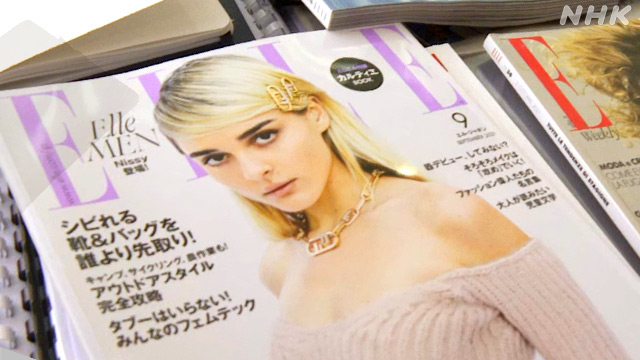Changes in European fashion “No more hurt animals” May 2, 12:13
The world-leading European fashion industry is now beginning to change dramatically.
Famous brands are proclaiming "depilation" one after another.
Furthermore, there is an active movement to develop new materials without using leather.
I searched for where the fashion industry, where the idea of "not damaging animals" spreads, is heading.
(Akiko Koyama, Directorate General of Europe)
Fashion brand "fur-free" declaration
Headquartered in Paris, Kering is a leading fashion group with brands such as Gucci and Saint Laurent.
Last September, the group announced that they would stop using fur for all brands from this autumn collection.
Following Gucci, which has already been discontinued, famous brands under its umbrella are shifting to "fur-free" one after another.
Kering Francois Henri Pinault Chairman and CEO
"The world is changing and luxury brands need to adapt, of course."
Italy's Armani has been “fur-free” since 2016 and Prada since 2020.
Over the last few years, there has been a series of movements to discontinue the use of fur among fashion giants.
That fashion magazine too
Fashion magazines dealing with famous brands will follow.
Launched in Paris and sold in 43 countries and regions around the world, "ELLE" has decided to stop listing fur products altogether.
Why did the world's leading fashion magazines make such a decision?
When I asked CEO Constance Benke, he said, "Fur no longer fits our values."
El International Constance Benke, CEO
"If we do this, we can raise the awareness of our readers about animal welfare.
It will create sustainable and innovative alternatives and drive the fashion industry. It also leads to. "
Spread of animal welfare
The idea behind these movements is the idea of "animal welfare."
Originally born in England in the 1960s, it was a problem that chickens and cows were placed in a poor breeding environment.
Now the target is expanding to pets and so on.
From 2024, it has been decided that the sale of dogs and cats in pet stores will be banned in France.
The idea is that we must reduce the number of dogs and cats that are easily kept and thrown away.
There is a strong opposition from the industry that it is strange to regulate only face-to-face sales despite the large amount of sales on the Internet.
Still, it's gaining widespread understanding, with findings showing that 75% of the population is against selling animals in pet stores in the first place.
Increasing consumer awareness
This growing awareness of animal welfare is beginning to spread to the fashion industry.
In a January poll in France, 89% said they were against genuine fur products.
Eri Inoue, who covers the fashion industry based in Europe, points out that there are also circumstances on the part of brands that want to gain the support of the younger generation.
Fashion journalist Eri Inoue
"Gen Z (born in the late 1990s and 2000s) has a high awareness of the environment, and emphasizes eco-friendliness and ethical issues when choosing products.
Major future customer base Fashion brands that want to capture them want to get rid of the bad image of using "fur made by killing animals". "
Widespread use of alternative materials
The fashion industry is developing materials to replace fur and animal leather.
Of these, Gucci announced a new material last year.
Made from non-animal-derived, renewable ingredients, it is used in sneakers and other items.
too good to waste!
Made from fish skin that is discarded at sushi restaurants
In February, a variety of fashion materials were shown at a trade fair near Paris.
While new materials such as cacti and pineapples are on display, "fish skin" has received a lot of attention.
It was developed by Banjaman Maratre.
I saw a lot of fish skins discarded at a sushi restaurant in France and wondered if they could be reused.
After carefully washing the freshly-picked salmon skin at the sushi restaurant, color it with a coloring agent.
After drying and adding depth to the color, use a machine to soften it and you're done.
It is durable and can be used for more than 10 years.
So far, it has sold products to nearly 1,400 customers around the world, and is now negotiating with major brands around the world.
Banjaman Maratre "French people eat a lot of
fish
and most of the skin is thrown away.
I wondered if I could find value in the waste skin again and reborn it as a material that can be used for a long time.
We will continue to develop the leather to see if it can be used. "
How far will it spread?
Animal welfare
The movement of animal welfare to spread is not limited to fashion.
Swedish car maker Volvo Car announced last September that it would stop using leather in all new electric vehicle seats and replace it with recycled materials.
"Being an advanced car maker means we need to work on all areas of sustainability, not just carbon dioxide emissions," Volvo explains.
Animal welfare that spreads rapidly.
Fashion journalist Eri Inoue says it will be a corporate social responsibility.
Fashion journalist Eri Inoue
"Working on animal welfare is no longer an absolute requirement.
To show that it's not just about creating an image, companies need to increase the transparency of the production process and disseminate credible information. Will be able to
With a wider range of choices for us, it may become commonplace to think "animal-friendly" alongside design, price, and materials.
What are your criteria for choosing clothing?
Akiko Furuyama ,
Directorate General of Europe Joined the Hiroshima Bureau in
2011.
After working at the International Department, she is now based in Paris and covers social issues in France.

